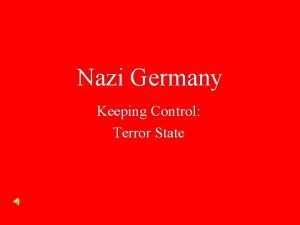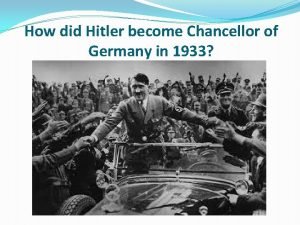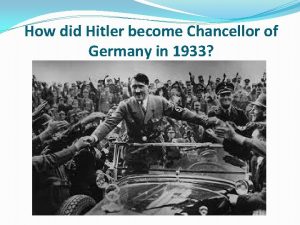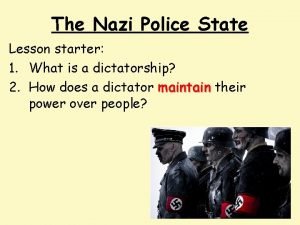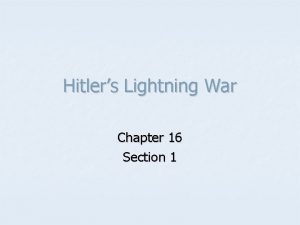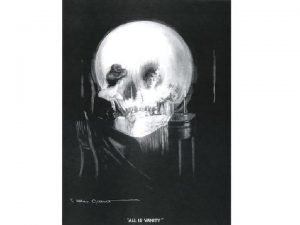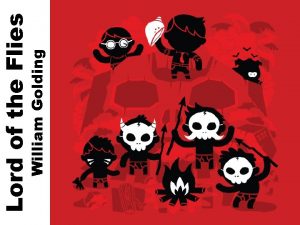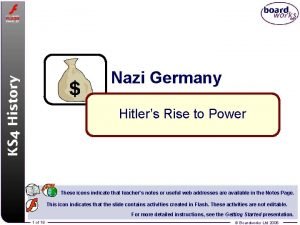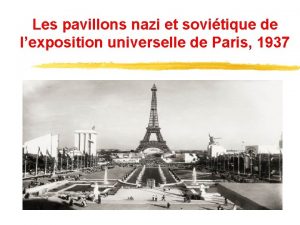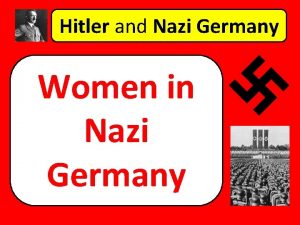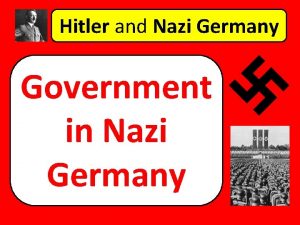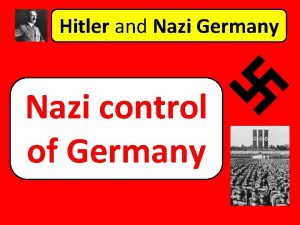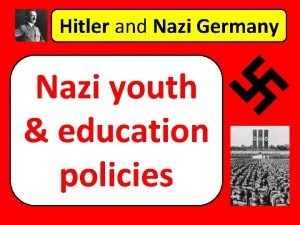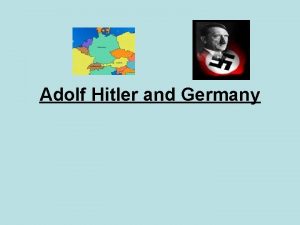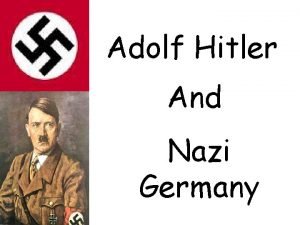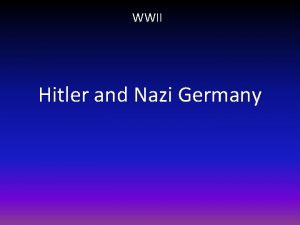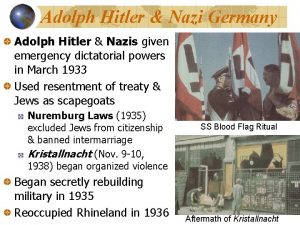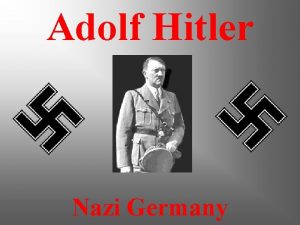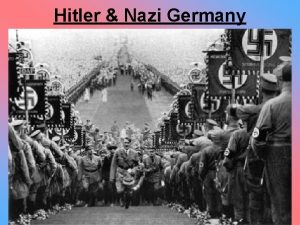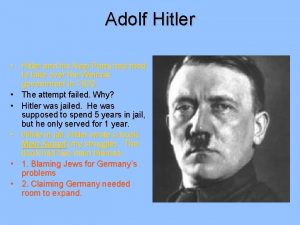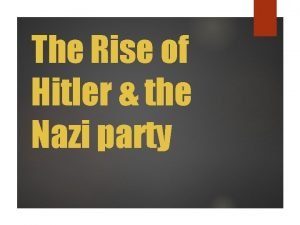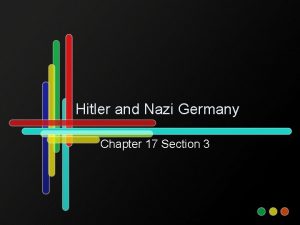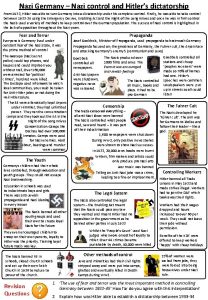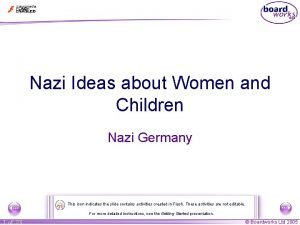Hitler and Nazi Germany CHAPTER 15 LESSON 3




















- Slides: 20

Hitler and Nazi Germany CHAPTER 15 LESSON 3 DAY 1

Starter

Starter

Objective �Students will be able to 1) Explain how Hitler came to power in Germany; and 2) Explain how he was able to carry out his policies.

Question �What impressions or words come to mind when you hear the name Adolf Hitler?

Mini Bio Hitler �Mini BIO Hitler

Vocab �Nazi: shortened form of the National Socialist German Workers’ Party; a member of such party �Concentration Camp: a camp where prisoners of war, political prisoners, or members of minority groups are confined, typically under harsh conditions

Group Questions (305 -306) 1. What was at the core of Hitler’s ideas? 2. What theory did Hitler emphasize in Mein Kampf? 3. How did the economic climate in Germany help the Nazis rise to power? When did this occur? 4. What year was the Enabling Act passed? How did it give Hitler control of Germany? 5. What did the Nazis do with their new power?

Answers 1. 2. 3. 4. 5. Racism, especially anti-Semitism, coupled with extreme nationalism, supported by anticommunism and Social Darwinism. The right of superior nations to overtake lesser ones and the right of superior individuals to gain authoritarian leadership over masses. Unemployment had increased dramatically between 1931 and 1932, increasing German dissatisfaction with the Weimar Republic. This occurred in 1933; It suspended the constitution so that Hitler no longer needed the Reichstag or the president to approve his actions. Political parties other than the Nazi Party were abolished, and all Jews were removed from civil service. The Nazis set up concentration camps for people who opposed them.

Group Worksheet Questions � 1. What happened to most workers’ real earnings after factories were closed? How did hyperinflation affect Germany’s economy after World War I? � 2. How did Hitler use the economic climate to fuel racism, nationalism, and the rise of the Nazi state? �Economic Worksheet

The Rise of Adolf Hitler • Born in Austria in 1889 • In 1919, joined German Workers’ Party, later renamed National Socialist German Workers’ (Nazi) Party • He was an extreme nationalist • He promoted racism and bigotry o • Blamed Jews for Germany's defeat in World War I and its economic troubles In November 1923 staged armed uprising (Beer Hall Putsch) and was sentenced to prison; wrote Mein Kampf there which outlined his basic philosophy and ideas.

The Rise of Adolf Hitler • After release from prison, expanded Nazi Party so that it could compete for votes • Decline of German government leaders’ popularity in late 1920 s and early 1930 s due to economic problems (unemployment) • Popularity of Hitler’s nationalist appeals, leading to Nazis’ becoming largest party in German parliament in 1932

Hitler’s Ideas �Racism, especially anti-Semitism, coupled with extreme nationalism, supported by anticommunism and Social Darwinism were at the core of Hitler’s ideas. �He also believed in the right of superior nations to overtake lesser ones and the right of superior individuals to gain authoritarian leadership over masses.

Rise of Nazism �Realizing that the Nazi Party would have to gain power by legal means, Hitler expanded it into a mass national party, attracting Germans who were disaffected by Germany's economic problems and were attracted by the Nazis' nationalism and militarism. �Hitler then gets appointed chancellor of Germany in 1933

The Nazis Take Control �After President Hindenburg allowed Hitler to become chancellor, the Nazi-dominated Reichstag passed the Enabling Act, legally allowing Hitler the power to ignore the German constitution for four years while he passed laws to deal with the country’s problems.

The Nazis Take Control �The Enabling Act made Hitler a dictator, and the Nazis quickly took control of all German institutions. Hitler purged the civil service of democratic elements and of Jews. He also abolished all political parties excepts the Nazi party and set up concentration camps for people who opposed him. �When Hindenburg died, Hitler became the sole ruler of Germany—the Führer.

Question �How did the Enabling Act contribute to Hitler’s rise to power?

Hitler

Quick Assessment

 Lesson 3 hitler and nazi germany
Lesson 3 hitler and nazi germany Hitler terror quotes
Hitler terror quotes Schutzstaffel
Schutzstaffel What is this image
What is this image Nazi aggression map
Nazi aggression map The truman doctrine was rooted in the idea of
The truman doctrine was rooted in the idea of How did hitler become chancellor
How did hitler become chancellor How did hitler become chancellor of germany
How did hitler become chancellor of germany Nazi police state lesson
Nazi police state lesson Chapter 16 section 1 hitler's lightning war
Chapter 16 section 1 hitler's lightning war Sex boutique london
Sex boutique london William golding nazi
William golding nazi William golding nazi
William golding nazi Nazi partys
Nazi partys Simpson lord of the flies
Simpson lord of the flies Wolfsangel tattoo
Wolfsangel tattoo William golding facts
William golding facts William golding nazi
William golding nazi Imagen de nazi
Imagen de nazi Pavillon nazi
Pavillon nazi Henry madden nazi
Henry madden nazi

